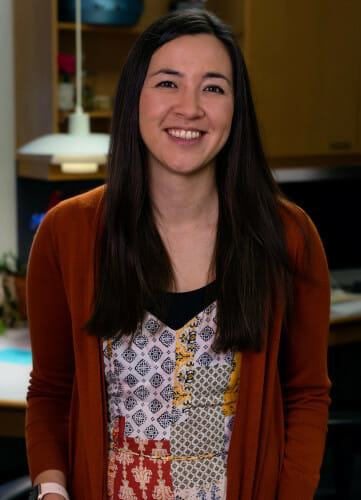UW–Madison biochemist named HHMI Freeman Hrabowski Scholar

Judith Simcox
If you walk into the office of biochemistry Professor Judith Simcox — named today to the first cohort of the Howard Hughes Medical Institute Freeman Hrabowski Scholars Program — you’re likely to find that she’s not alone. That’s because Simcox values her role as mentor and educator as much as she values the transformational research coming out of her lab.
“I can’t explain how grateful I am for this award,” Simcox says of the HHMI honor. “This award is not just about excellence in science, but also in mentorship. We must define excellence by both innovative research and investing in the scientific community. HHMI does a good job at that, and I feel really honored.”
This year, HHMI’s new, $1.5 billion Freeman Hrabowski Scholars Program will support 31 outstanding early-career researchers committed to advancing diversity, equity and inclusion in science.
“Each of our Freeman Hrabowski Scholars has demonstrated their unique potential to advance cutting-edge science and carve out pathways for the inclusive development of postdocs, students and other researchers,” says HHMI Vice President and Chief Scientific Officer Leslie Vosshall. “We are thrilled to welcome this inaugural cohort to HHMI, and we are proud to support each Scholar’s contributions to the broader scientific community in the years to come.”
Simcox’s approach to science is twofold: She is working toward increasing diversity in the populations included in biomedical studies, and she is hiring researchers who will help to broaden the ways her lab approaches and asks research questions.
Simcox’s research seeks to fill in gaps in knowledge (held over from an era when biomedical research focused almost exclusively on men of Western-European descent) about the relationships between cardiovascular disease and lipids, which are fatty molecules like cholesterol and some vitamins and hormones. She investigates which lipids are associated with cardiovascular disease in different populations and the enzymes that regulate these lipids.
Current medical approaches for controlling cardiovascular disease — namely, using medications called statins to help patients regulate cholesterol levels — are not equally effective across populations. Simcox’s research seeks to address this problem by gaining broader knowledge about which lipids are associated with cardiovascular disease, thus making for more effective preventative care, diagnosis and treatment.
What Simcox and others have found is that many of the biomarkers commonly associated with cardiovascular disease do not necessarily predict disease across diverse populations.
Simcox’s investigation to expand our understanding of lipidomics — or the makeup of lipids — in diverse populations fits with HHMI’s commitment to advance diversity, equity and inclusion in science in novel and creative ways. Simcox and her lab are starting to identify previously underexplored lipids that may serve as biomarkers for cardiovascular disease.
Through mass spectrometry, which can measure hundreds of thousands of lipids in the plasma of blood samples, the researchers can sort lipids based on biochemical characteristics. From there, Simcox’s group can identify similarities and differences in the lipids associated with cardiovascular disease among populations.
“It’s truly lipidomics on everyone!” says Simcox, whose lab has already begun to find distinct makeups of lipids among Native American communities in Wisconsin, including through collaborations with the Menominee and Oneida nations.
After identifying different lipid species in the plasma, Simcox can investigate their characteristics, including their origin, their role in health and disease, how they’re transported and how they are regulated, to learn more about how to approach controlling lipids associated with disease.
The science behind the research, however, is just one part of what is needed for its success.
“I want to radically shift the way we do research,” says Simcox. “And that’s not just in the discoveries that I’m hoping to lead; it’s how we do community-based research and how we include communities in that research.”
Researchers in the Simcox Lab will work with community members to build relationships, establish trust and set protocols to ensure that people within these communities benefit from the research. When data for Simcox’s work is derived from blood samples collected from citizens of Native American tribes, for example, the data are ultimately owned by the tribes themselves, not the researchers.
Simcox is also hiring and mentoring researchers from within communities that have been historically overlooked or excluded in biomedical research. “When people who are members of the community are working on these projects,” says Simcox, “it leads to better questions.”
With $2 million in funding over 5 years from HHMI, Simcox is looking to support the next generation of investigators by adding three postdoctoral researchers to her team.
Simcox says of junior scientists, “If I could tell them one thing, it’s that their perspective is valuable to science and the way we approach things. It has to be matched with the discipline and rigor of the scientific method, but their unique perspective is important to overcome the challenges we are facing in the world.”



